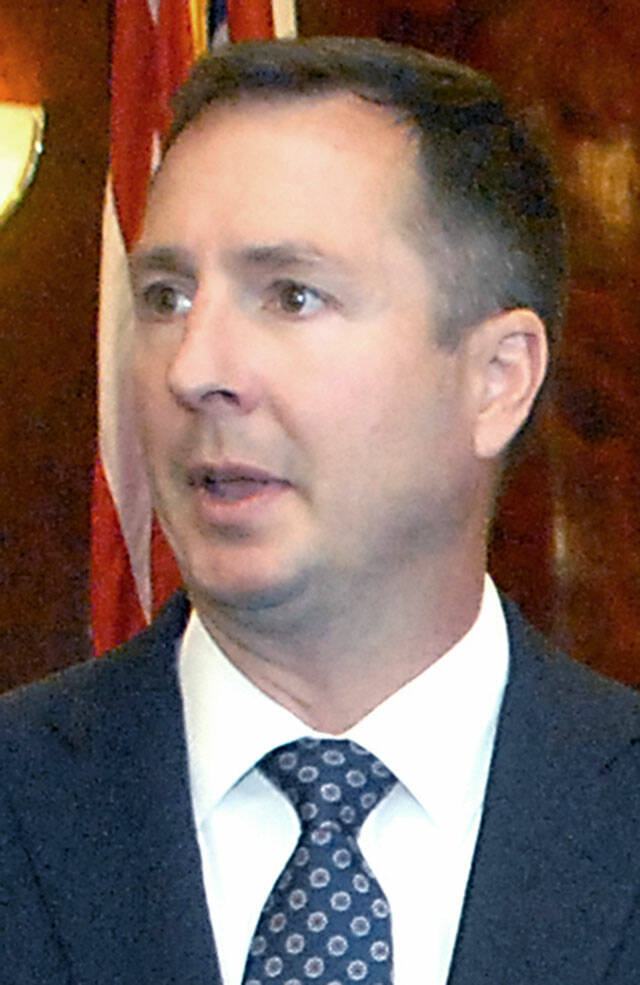PORT ANGELES — Proposed changes to the number of cases Washington public defenders are allowed to work each year could have dire impacts, particularly for rural counties, many of which already struggle with providing legal services.
The Washington State Bar Association (WSBA) approved caseload limits last month for public defenders in the state in an effort to reduce the workload many attorneys are facing, but local governments have raised concerns about the impacts to local legal systems.
“With the new caseload standards, reducing the number of cases that any one attorney can handle, the implication is you’re going to have to hire a lot more attorneys to keep up with the volume of cases,” said Clallam County Prosecuting Attorney Mark Nichols. “Somebody’s going to have to pay for that lot more attorneys, and it’s counties.”
As prosecutors, Nichols and his attorneys won’t face the same limits, but there are still concerns about how the court system will be affected, he said.
The Sixth Amendment of the U.S. Constitution guarantees the right to an attorney at public expense, but providing that legal assistance has long been a challenge. The state bar association said in a statement the revisions to the caseload standards were in response to studies that suggest public defenders are working too many cases even as those cases grow more complex.
“These changes will provide public defenders with workable caseloads that allow them to effectively represent the accused,” said Jason Schwarz, chair of WSBA’s Council on Public Defense, in a March 15 statement. “The standards reflect national professional norms after years of research and study. They are critical for upholding our Constitutional obligations to the accused and critical to assuring litigants have access to a fair trial.”
The reduced caseload standards would be implemented over three years, with the first reduction going into effect in July 2025 and the final reduction in July 2027.
Harry Gasnick, the chief public defender for Clallam County, said Thursday he has concerns about how the new rules will impact his office. Public defender caseloads are capped at 150 felonies, or 400 misdemeanors per year, according to The Associated Press, but that will change incrementally beginning in 2025 and reach a new cap of 47 felonies or 120 misdemeanors in 2027, with lower maximums for certain case types.
“Once the new standards are fully phased in, the number of cases that can be handled by any given attorney will be reduced by a factor that I estimate a factor of 50 percent or more,” Gasnick said. “Which would mean the staffing requirements to handle those caseloads would double or perhaps even triple, with commensurate increases in non-attorney staffing.”
Funding for prosecuting attorney’s offices comes partially from the state, but counties alone are responsible for funding public defense services. The state has provided grants for defense services, Gasnick said, but in amounts that cover only a portion of the cost of services.
The Washington State Association of Counties has asked the state bar to help lobby the Legislature in order to secure funding for the proposed changes, but even if funding were provided, there may not be enough attorneys to fill those roles.
Shortages of attorneys have been reported nationally with the problem exacerbated in rural areas. Gasnick said his office has been able to hire some attorneys, but it’s not currently fully staffed.
“There tends to be a thought that if you throw enough money at a problem, the problem can go away,” Gasnick said. “I don’t know that the issues regarding the availability of attorneys wanting to do prosecution and public defense is entirely a money problem, other issues come into play.”
Particularly since the COVID-19 pandemic, many lawyers are looking for more remote work opportunities, and rural communities don’t always offer the amenities some are looking for. Nichols said his office has struggled to hire attorneys even as compensation and signing bonuses have increased.
The state Supreme Court will ultimately make the decision whether or not to adopt the standards, which it should do later this year. But if the new caseload limits are adopted, rural counties could be especially hard hit.
“It’s an issue we’re still trying to wrap our heads around,” Gasnick said. “It’s something that we’re going to have to very closely monitor. I’ve been trying to come up with an answer for this, and I haven’t been able to.”
________
Reporter Peter Segall can be reached by email at peter.segall@peninsuladailynews.com.

